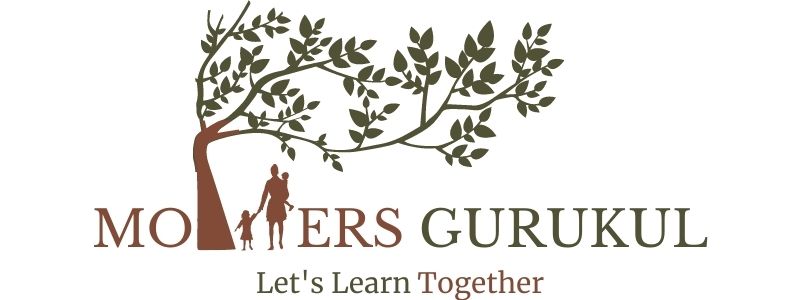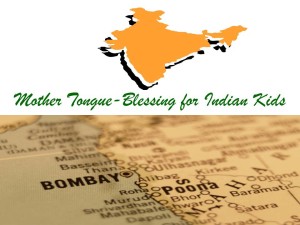Our mother tongue is a gift we were privileged to receive by virtue of our birth. Originally, from Maharashtra but born and raised in Kanpur, I myself have experienced the advantages of knowing my mother tongue. Thanks to my grandparents and parents who laid a very strong foundation for us and also given us as many opportunities as they could in finding and exploring different ways to stay connected to our culture and mother tongue.
Telling from my own experience what a wonderful feeling it is to know an additional language, which today has become one of the most challenging tasks for parents living outside India. Living abroad but at the same time staying connected to our roots and passing on our culture (which has language as its integral part) to our next generation is becoming more and more demanding. Sentences like “Our kid doesn’t talk in our mother tongue….”. “We tried and tried but no success…it’s so tough….” are commonly said by Indian parents living outside home country (India in my case). But is it as difficult as it sounds? I don’t think so. What it demands is little bit of patience, time and discipline. Kids are smart enough to sense the dilemma of parents and so they test it.
If kids can learn any other foreign language then why not their own language? Today, technology has made everything on our fingertips. Lots of mobile apps are out there to make the learning more interesting. Language learning software like Rosetta stone, Live mocha, and language schools are some of the mediums which can be a good start for the learning process. Needless to say that grandparent is the best school. It is surprising that how much a kid can learn from their grandparents in general day-to-day conversation. If kids are encouraged for talking to their grandparents in their mother tongue then it’s like a win-win situation. Not only this creates a special bond between the two but this is also a great way to learn the language. Also, during India trips it gives lot of comfort and confidence to the them when they know that they would be able to hold a conversation there.
Few months ago, we went to India. My daughter still talks about our trip and ask about her friends she made during her stay there. Language wasn’t a barrier for her but acted as a connector. She was comfortable in expressing her feelings both in Marathi and Hindi. This helped her a lot in enjoying her India trip as we did and also a comfort feeling for us that she is happy and not feeling isolated. ‘Feeling of isolation’ is another area of concern for parents living in abroad when they go to their home country. Kids on the other hand aren’t that excited because of an anxiety that they will be bored. Sometimes they get a different treatment in terms of conversation. It’s a general perception that kids are more comfortable with English and when they visit their relatives back home this practice gets continued. Just to make them feel at ease relatives and friends talk to them in English. But this can go either way. When they see other kids talking in different language which they are not able to understand they get inferiority complex which can be a negative impact on their self-esteem. Looking from the positive side it may motivate them to learn the language. So, it is truly challenging.
I heard Sudha Murthy (Indian social worker and author and Chairperson of Infosys Foundation) saying in one of her interviews that knowing mother tongue is as important as knowing English. With Globalization, being comfortable with English has become today’s demand. We all have different dimensions that build our personality. Mother tongue is one of the dimensions of a person’s self being. She gave the example of Krishna-we know him as Devaki Nandan and also as Yashoda Nandan.
But the most important part is don’t give up, as they say parenting is an on-going process and preserving our heritage, cultural awareness, and native language is more important than what we realize. Keep the momentum going and sticking to our decision is the key.


Hey Alpana,
Congratulations on the website 🙂 I could not agree more with you on this topic. i have always felt very strongly about teaching kids their mother tongue. i think it also teaches them to be comfortable with their own identity and be proud of where they are from and their roots. I don’t have kids yet but teaching them Sindhi and Hindi before English is already on top of my “to-do” list :).
Look forward to many more great thoughts and articles from you.
Hi Beena, Thanks for your feedback and words of encouragement. Glad you liked the post. I will be posting some new blogs soon. Keep the feedback coming..
I also agree wid u. We , as parents , were always careful abt d thing tht our kids should know their mother tongue first. Other languages , in any case , they will learn – either in their schools or thru their friends. Today , in d age of such short forms and net language ( which is apparent in my reply also… 🙂 … ) , it is equally important tht d roots r strong.
Also , I wud like to add tht d parents who find it difficult to teach their kids their mother tongue , should start speaking in tht language first. Kids learn wat they see and listen to.
Lastly , congratulations for ur new website. Keep d good work going. All d best.
Shradha, Thanks for the appreciation.